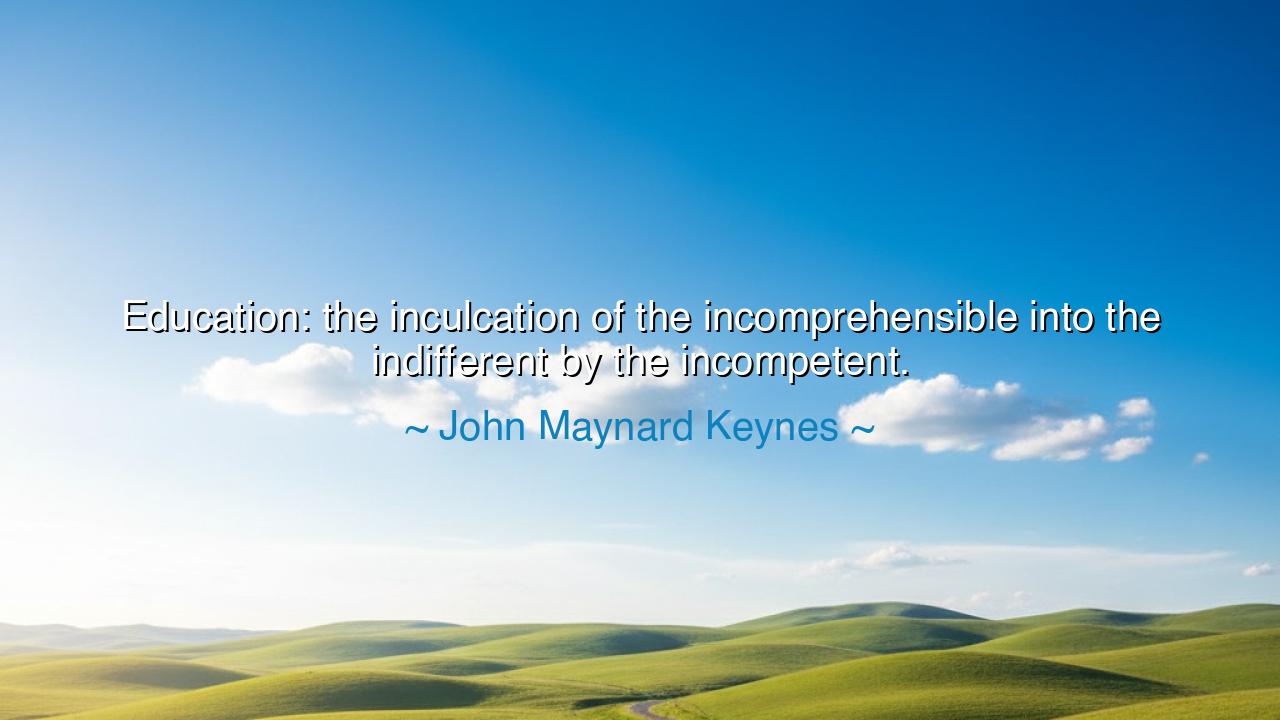
Education: the inculcation of the incomprehensible into the
Education: the inculcation of the incomprehensible into the indifferent by the incompetent.






Hear, O seekers of truth, the biting words of John Maynard Keynes, who with sharp wit declared: “Education: the inculcation of the incomprehensible into the indifferent by the incompetent.” At first hearing, these words may sound harsh, a satire flung against the noble art of teaching. Yet beneath the humor lies a lament, a cry against the failures of systems that too often betray the sacred promise of learning. Keynes, master economist and keen observer of men, saw in his time that much of what was called education had become empty ritual—truth hidden by jargon, students dulled by apathy, teachers shackled by inadequacy.
The phrase “incomprehensible” points to the tendency of institutions to obscure knowledge rather than reveal it. Instead of wisdom clothed in clarity, students are often handed confusion, doctrines shrouded in words without light. The sciences, the arts, even philosophy itself can become prisons of terminology, where the heart of truth is lost in the fog. Keynes ridicules this folly, for the purpose of education is not to mystify, but to enlighten.
The word “indifferent” cuts even deeper. For what is worse than knowledge poorly delivered, if not a student who cares not whether it is received? Indifference is the death of the soul, the dulling of curiosity, the extinguishing of wonder. A child once alive with questions can become, through poor instruction and lifeless schooling, a hollow vessel, unmoved by beauty, truth, or wisdom. Keynes saw this as a tragedy, for the flame of curiosity is the very breath of progress.
And then he names the incompetent—those teachers who, through lack of preparation or devotion, fail to kindle the fire. This is not to condemn all who teach, for many are noble and faithful. But Keynes strikes against the system that allows unworthy shepherds to guard the flock of youth. For a teacher without passion is a danger; their words may wound rather than heal, may deaden rather than awaken. Thus his scorn is not for the idea of education itself, but for its corruption.
History bears witness to this truth. Consider the France of the ancien régime, where schools often drilled students in Latin and rote memorization, yet left them unable to think for themselves. It was this lifeless instruction, as much as poverty and oppression, that left the people unprepared for reasoned debate, and thus vulnerable to the storms of revolution. Contrast this with the teaching of Socrates, who unsettled the complacent, provoked thought, and refused to allow students to remain indifferent. His method was the antidote to the very problem Keynes laments.
Yet even in the sharpness of his satire, there is hope. For satire is the weapon of one who loves what he mocks. Keynes knew that education, rightly done, is the seed of civilization. His words were meant not to destroy, but to awaken—to challenge students to resist indifference, and teachers to rise above incompetence. By naming the sickness, he calls us to seek the cure: clarity of teaching, curiosity in learning, and integrity in both.
Therefore, O children of tomorrow, take this lesson: resist becoming the indifferent, demand clarity when met with the incomprehensible, and seek teachers who are not incompetent, but filled with fire. And if you are called to teach, do not take your role lightly, for upon you rests the shaping of souls. Cast aside empty jargon, awaken curiosity, and speak with clarity and passion. In doing so, you redeem the word education from Keynes’s satire and restore it to its true glory.
The final word is this: satire reveals what we must avoid, and truth reveals what we must pursue. Let us heed Keynes’s warning, lest education become a lifeless ritual. Let us instead kindle it into a living flame, where teachers inspire, students hunger for truth, and knowledge is no longer incomprehensible but radiant with light.






AAdministratorAdministrator
Welcome, honored guests. Please leave a comment, we will respond soon